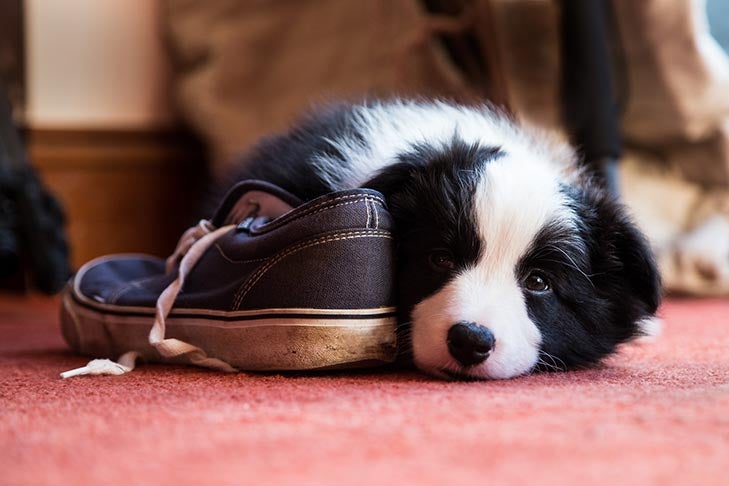
|
Puppies come tumbling into our lives full of exuberance, energy, and a wholehearted enthusiasm for life. It is natural that we wonder how they perceive the world, and if they see, hear, and smell differently than we do. We want to share their experiences. First, though, we need to understand how puppy senses work.
How Well Can Puppies See?
åFor the first two weeks of their lives, puppies can’t see their worlds. Their eyes open when they are 14-to-21 days old, but their sight is still limited. Humans rely heavily on sight, so of course we want to know if our dogs do, too.
You may have heard the popularly held belief that dogs are color blind. This is not entirely true. Dogs’ eyes do not have as many cones responsible for color vision in their retinas as humans do, according to the Merck Veterinary Manual. Your puppy can see color, but we can safely conclude that he cannot see the same spectrum as we do. If you want to buy some toys in colors your puppy will be able to distinguish, go for blue or yellow.
Don’t worry, your puppy is not missing out. Puppies might not see the same range of color as we do, but they certainly see better in the dark. Puppies have more rods in their eyes, which means that they see much better in dim light than we do.
When it comes to detail, though, we still have the upper hand. Ever wonder why your puppy can’t always see the treat right in front of him, but can usually track a treat or toy you throw? This is because dogs are natural hunters. Their eyes have developed to detect movement, not fine details.
How Well Can Puppies Hear?
Puppies are born deaf, and this is the last of their senses to fully develop. They can’t hear until they’re about three weeks old. Once their hearing kicks in, they hear about four times better than most people, including hearing a wider range of frequencies.
You’ve probably noticed that your puppy can hear things that you can’t. You’ve seen her cock her head to one side and look off in the distance, long before the object or person comes into sight.
Dogs’ ears have much deeper canals than ours, which creates a better funnel for sound to carry down to their eardrums. All dogs, but especially those with upright ears, such as German Shepherd Dogs, use their ears almost like radar antennas, thanks to the 18 muscles they have to fine-tune the ear’s position and essentially “turn up the volume” on their hearing.
“This can also makes dogs more sensitive to some loud noises than humans – this explains why thunder or fireworks may be puzzling, frightening, or even painful,” explains Dr. Jerry Klein, AKC chief veterinary officer.

How Well Can Puppies Smell?
When it comes to sense of smell, your puppy’s is far superior to yours. A dog’s sense of smell is approximately 10,000 to 100,000 times more sensitive than yours. While we have about 6 million olfactory receptors, dogs have approximately 300 million. A larger portion of a dog’s brain (about 40 times greater than a human’s) is dedicated to figuring out what those smells are. Also, people smell things and breath through the same airways, but a dog’s nose is structured to separate these tasks.
It is no wonder that we use dogs to sniff out explosives, drugs, and missing people, and this also explains why your puppy is able to smell where you hid the treats.
Puppies navigate by smell from the moment they are born, when their eyes are closed and their hearing has not developed. Dogs even have a special organ on the roof of their mouth, called Jacobson’s organ. Puppies use it to find their mother and her milk, and adult dogs detect pheromones from female dogs in heat or from dog urine.
“Your puppy sees, hears, and smells the world differently than you do,” says Dr. Klein. “This is part of what makes raising a puppy so exciting, and why humans have developed such a special relationship with our canine companions.”
Some breeds have more developed senses than others. Bloodhounds, for instance, have exceptionally powerful noses, while sighthounds like Greyhounds are better at spotting game. Learning as much as you can about your puppy’s senses and how he experiences the world is a great way to understand his needs and will help you become a more informed and responsible dog owner.
| Want to learn more about your puppy? |
This article is intended solely as general guidance, and does not constitute health or other professional advice. Individual situations and applicable laws vary by jurisdiction, and you are encouraged to obtain appropriate advice from qualified professionals in the applicable jurisdictions. We make no representations or warranties concerning any course of action taken by any person following or otherwise using the information offered or provided in this article, including any such information associated with and provided in connection with third-party products, and we will not be liable for any direct, indirect, consequential, special, exemplary or other damages that may result, including but not limited to economic loss, injury, illness or death.


